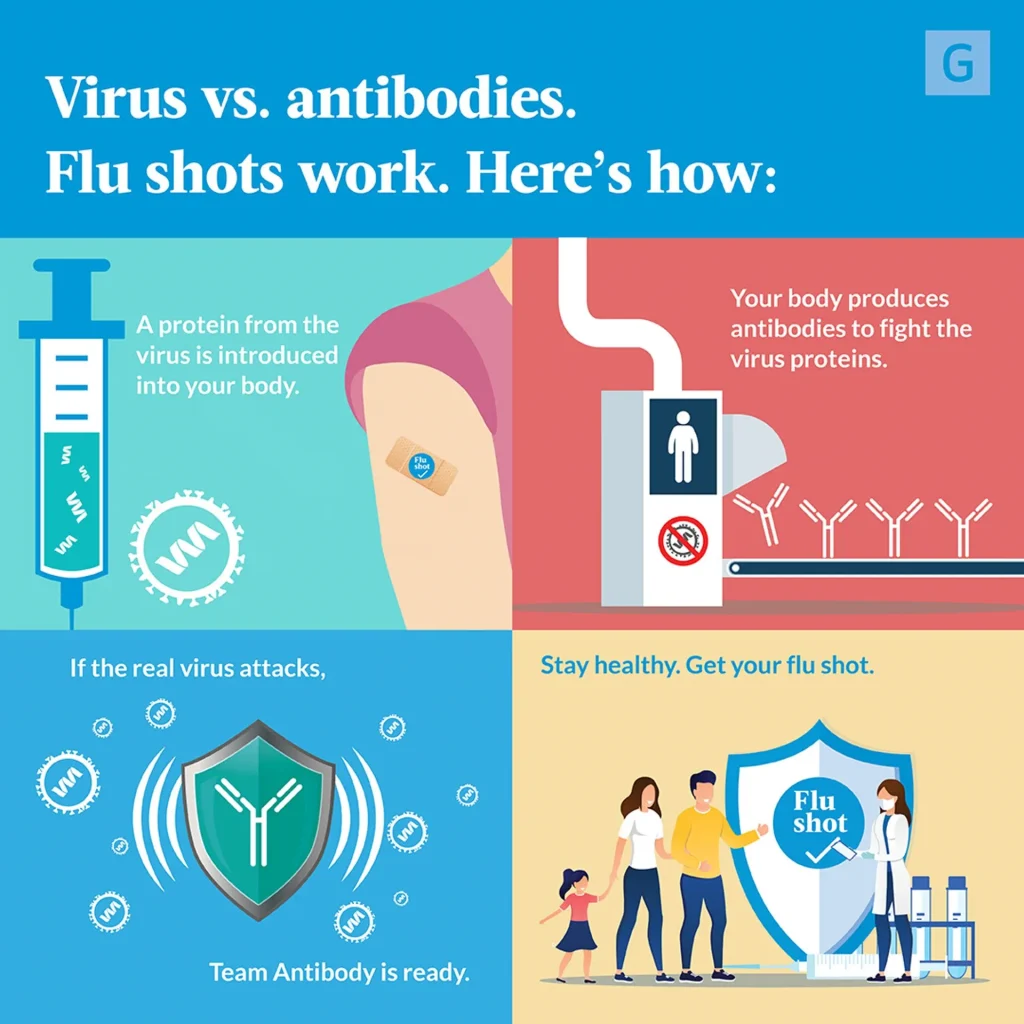Flu season comes every year, but it’s hard to predict how severe it will be — or how bad you’ll feel if you get the flu. Maybe you’ll just miss a few days of work or school. But you could also get more seriously ill with complications.
So each year, it’s recommended that everyone age 6 months and older, with few exceptions, get a flu shot. Why? Because it’s the best way to protect yourself from the flu — and helps prevent serious illness, hospitalizations and even death.
Vaccination also reduces the chance you’ll pass the flu on to others and helps to build herd immunity that protects the most vulnerable people in your community.
Wonder how the flu shot works to provide this protection? Stanley Martin, MD, director of the Geisinger Division of Infectious Diseases, shares the science behind this lifesaving vaccine.
How do flu shots work?
Flu shots are formulated to train your body to recognize and fend off influenza viruses when you’re exposed to them.
“The vaccine works by introducing a small, harmless protein from the virus into your body,” says Dr. Martin. “This triggers an immune response, causing your body to produce specific antibodies to fight the disease, while also training your body to identify the threat later on.”
These antibodies stay in your bloodstream, ready to act if you encounter the actual flu virus in the future.
Having those vaccine-produced antibodies makes you less likely to get sick. And if you do catch the flu, your symptoms won’t be as severe.
How long does the flu shot take to work?
In general, it takes about 2 weeks for your body to develop enough antibodies to offer the best protection against the virus. That’s why it’s smart to get your vaccination in the fall, before flu season even begins.
“Ideally, everyone should be vaccinated by the end of October,” says Dr. Martin. “Flu shots typically remain effective for about 6 months. So, receiving the flu shot too early in the season could lead to waning immunity by the time peak flu activity occurs, typically between December and February.”
How is the flu vaccine made?
Each year, researchers determine which strains of the flu virus are the most likely to occur during the upcoming season and the vaccines are designed accordingly.
“There is often more than 1 type of flu virus circulating each season,” says Dr. Martin. “So most flu vaccines protect against 3 types of viruses. They include 2 influenza A (H1N1 and H3N2) strains and 1 influenza B virus.”
Whether they’re administered through a shot in the arm or through a nasal spray, most flu vaccines are made using an egg-based process. The virus is injected into fertilized chicken eggs, where it incubates and replicates for several days and is then harvested.
From there, the vaccine can be made from an inactivated virus, meaning the particles have lost their ability to cause disease, or from a live but weakened virus. This virus, used in the nasal spray vaccine, is too weak to infect people who are healthy.
The vaccine can also be made from a recombinant virus, which has been created synthetically in a lab instead of using the egg-based manufacturing process. This virus can’t reproduce and cause disease.
“All choices work equally well,” says Dr. Martin, “but the live virus is not recommended for anyone with a weakened immune system, pregnant women or those with certain other medical conditions.”
I’m allergic to eggs. Can I get a flu shot?
Because of the egg-based process, a minute amount of egg protein may be in the flu vaccine. But the amount is so small it’s negligible, and the vast majority of people with an egg allergy can tolerate the flu shot just fine. In fact, many people with an egg allergy have gotten the flu shot without any serious adverse reaction.
If you have a history of eggs causing severe anaphylaxis — a type of allergic reaction requiring hospitalization — there is a limited supply of egg-free flu vaccines.
If I miss the window, is it too late to get a flu shot?
Ideally, the best time for vaccination is before flu season, which typically starts in October and lasts until May. However, getting vaccinated later can still be beneficial — even if you’ve already had the flu.
“Geisinger offers flu shots through March, and getting the flu vaccine later is better than not getting it at all,” says Dr. Martin. “The flu virus can cause serious illness and complications that could result in hospitalization. Even though the flu shot isn’t 100% effective, it’s still your best protection against catching the flu.”
Get your flu shot at Geisinger
Every year, we make it as easy as possible for you to get vaccinated against the flu. You can make an appointment, walk into a clinic, pharmacy or provider’s office or visit a drive-through location. Vaccination is your “best shot” at preventing the flu or serious illness from it. That’s why we do everything we can to keep you, and the rest of the community, protected. See all the ways to get your flu shot.

Original Article:
![]()
